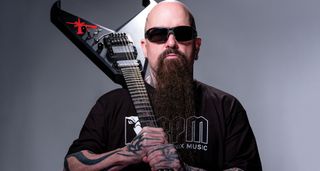Features

(Image credit: Getty Images)
It might have been a coincidence, or maybe an evil act of fate. But a major volatile career move put Phil Demmel in the front of the line to be the second guitarist for Kerry King, a gig Demmel now proudly holds.
In September 2018, following a 15-year tenure with Machine Head, Demmel quit the band – and lost the paycheck it provided – due to personal differences with frontman Robb Flynn.
Two days later, he got a call from Kerry King, who told him that guitarist Gary Holt had to drop off the Slayer tour due to a family emergency and asked Demmel if he could fly to Europe on short notice to play some shows.
“The timing happened to be good, and I think me stepping into the Slayer situation and learning 19 songs on the flight over to Europe made a good impression on Kerry and helped me when it came time for him to bring on a second guitarist in his new band,” Demmel says.
Demmel didn’t track any of the rhythm parts with King for From Hell I Rise, but he worked hard on leads; when it was time for him to record, he popped into the studio with King and producer Josh Wilbur and recorded around 10 solos and transition licks in three hours.
That’s not much of a time expenditure, for sure, but he was so well prepared that he didn’t need any longer. Demmel wrote all of his leads at home and ensured they complimented King’s songs before entering the studio.
“I wanted to make the string bends sound good with the rhythms, so I’ve been working a lot on my left-hand technique to make sure the bends and tremolo parts are in key,” Demmel says.
All the latest guitar news, interviews, lessons, reviews, deals and more, direct to your inbox!
“With this record, I wanted to make my signature sound a part of the songs and have that go hand-in-hand with the vibe of the music. I wanted my playing to stand out but also blend in well with what Kerry did.”
Kerry said you were persistent about playing in his new band.
“Let’s just say I made myself available. In 2018, I was poking around – ‘Hey, what are you doing next? What’ve you got going on after this?’ And he told me that he and Paul were gonna continue, probably with Gary [Holt], but he hadn’t made much of it. So, when I announced that I quit Machine Head, he texted me that day or the next day and said, ‘Ah, that’s why you were asking.’ And I told him, ‘Yeah, I’m available and would be up for whatever you want to do next.’”

(Image credit: Rayon Richards)
Did he get back to you right away with an offer?
“No. I filled in [live] for Gary in September for a few dates. Kerry got back to me in December and still kind of thought he was going to go forward with Gary. But then things changed. I don’t think he and Gary had any sort of fight or anything, I just think that Exodus is Gary’s baby and this would be Kerry’s thing.”
Slayer were going into Angel of Death. And I said, ‘Oh, my God. This is my last chance to pit for Slayer!’ Scotty says, ‘You gotta do it!’ So I went in and made some rounds in the pit with my reading glasses on my head
When did Kerry ask you to join him for the album and tour?
“I was in limbo for a good eight months after we talked. Then, on the opening night of football for the Raiders, we were at the Monday-night game. We went to celebrate afterwards, and that’s when he said, ‘So, this is what I’m thinking.’ He let me know that night.”
Are you looking forward to playing Slayer songs on tour?
“Fuck, yeah. I love Slayer. I went to the last show at the Forum in California. By then, I knew I was gonna be playing in his band. I had this crazy, surreal moment of watching Slayer from the front of house with [actor] Jason Momoa and Scott Ian and his family, and all these other celebrities.
“I was talking with Scott, and Slayer were going into Angel of Death. And I said, ‘Oh, my God. This is my last chance to pit for Slayer!’ Scotty says, ‘You gotta do it!’ So I went in and made some rounds in the pit with my reading glasses on my head the whole time. Such an old man thing to do!”
I could really tell from his vocal inflections that he was really instrumental in the vocal approach for a lot of the Slayer stuff and even with Tom’s vocals
What were the first new songs you heard from Kerry?
“I heard some of the demos. Crucifixation was one of them – and I also heard “From Hell I Rise.” This was before [Death Angel singer] Mark [Osegueda] did vocals, so it was Kerry singing on the songs. And I could really tell from his vocal inflections that he was really instrumental in the vocal approach for a lot of the Slayer stuff and even with Tom’s vocals.
“For obvious reasons, Kerry didn’t want to send any of the songs out and was pretty tight-lipped about sharing stuff. So he played a lot of the songs to me over his phone. By the time I got the music to record on, the rhythms were all done.”
How did you approach your leads for From Hell I Rise?
“I recorded stuff at my home studio and sent it back to him. My solo style is obviously different from Jeff Hanneman and from what Gary had been doing. So I wanted to make sure he was gonna be okay with that.
“What I’m doing is a little more melodic than what you’re used to hearing from Kerry’s music, but he was totally on board with it. I was glad about that because I wanted to stray away from all the brutal music and add a little dynamic to it with these more melodic lines.”
I have new material. When I was writing for Vio-Lence, Kerry said, ‘Well, save some of your good stuff for me,’ so he’s open to hearing material from me
Did you pre-write your leads or improvise them in the studio and then string them together?
“My leads were all planned out. I played through them and pieced them together at home. A lot of my stuff in Machine Head was thrown together in the studio. I wanted this to be a lot more structured.
“I wanted to get to the point where I could play my leads in one pass to make all the feelings and all the transitions natural. So I played my leads for months. We tried a couple things spontaneously, but for the most part, they were ready to go.”
Did you cater your playing style to fit into the Kerry King mold?
“No, but I wasn’t confident about it right away because in Machine Head, I couldn’t write riffs that sounded like Machine Head until I was in the band. But I quickly found that with Kerry, I can write in my style and it works with the songs.”
You finished the album a year ago. Was it frustrating to wait this long for it to finally come out? And have you contributed to any of the songs for the next Kerry King album?
“It’s funny because the album is almost out and we did a photo shoot for it a little while ago, and that was only the second time all five of us had been in the same room together. We haven’t jammed as a five-piece yet. But I have new material. When I was writing for Vio-Lence, Kerry said, ‘Well, save some of your good stuff for me,’ so he’s open to hearing material from me.”
Do you think you’ll be more involved in the songwriting process for the next Kerry King album?
“I’d like to be, but he’s pretty prolific and he gets his stuff done fast. So we’ll see what happens. We’ve yet to play a show together, and the second album will probably already be done by the time we do so, which is fine. I have outlets for my music to go. We’ll see how much I can be involved when the next record comes around.”
Tension is in 6/8, so there’s a lot of counting going on, but it’s really a matter of learning to speak that language again
What’s the hardest thing about learning the rhythm guitar parts for Kerry King?
“There’s a lot of triplet picking, and some gallops that I want to make sure I’m playing exactly like Kerry does. I’ve had to dissect a couple little tricky things. Tension is in 6/8, so there’s a lot of counting going on, but it’s really a matter of learning to speak that language again. When I was learning those 19 Slayer songs on the plane to Germany, I had to do the same thing.
“It’s kind of the Rosetta Stone language-learning immersion that I’ve adapted to learn all this stuff. That’s how it’s been with a lot of the bands I’ve played with. They have their language, and once you start to understand where they go with certain things – I call them conjunctions, how they put them together and how the transition segues work – then you’re that much closer to getting it down.”
From Hell I Rise is out now via Raging Phoenix Music America.

Thank you for reading 5 articles this month**
Join now for unlimited access
US pricing $3.99 per month or $39.00 per year
UK pricing £2.99 per month or £29.00 per year
Europe pricing €3.49 per month or €34.00 per year
*Read 5 free articles per month without a subscription

Join now for unlimited access
Prices from £2.99/$3.99/€3.49
Jon is an author, journalist, and podcaster who recently wrote and hosted the first 12-episode season of the acclaimed Backstaged: The Devil in Metal, an exclusive from Diversion Podcasts/iHeart. He is also the primary author of the popular Louder Than Hell: The Definitive Oral History of Metal and the sole author of Raising Hell: Backstage Tales From the Lives of Metal Legends. In addition, he co-wrote I’m the Man: The Story of That Guy From Anthrax (with Scott Ian), Ministry: The Lost Gospels According to Al Jourgensen (with Al Jourgensen), and My Riot: Agnostic Front, Grit, Guts & Glory (with Roger Miret). Wiederhorn has worked on staff as an associate editor for Rolling Stone, Executive Editor of Guitar Magazine, and senior writer for MTV News. His work has also appeared in Spin, Entertainment Weekly, Yahoo.com, Revolver, Inked, Loudwire.com and other publications and websites.
>>> Read full article>>>
Copyright for syndicated content belongs to the linked Source : GuitarWorld – https://www.guitarworld.com/features/phil-demmel-on-leaving-machine-head-slayer-and-kerry-king













